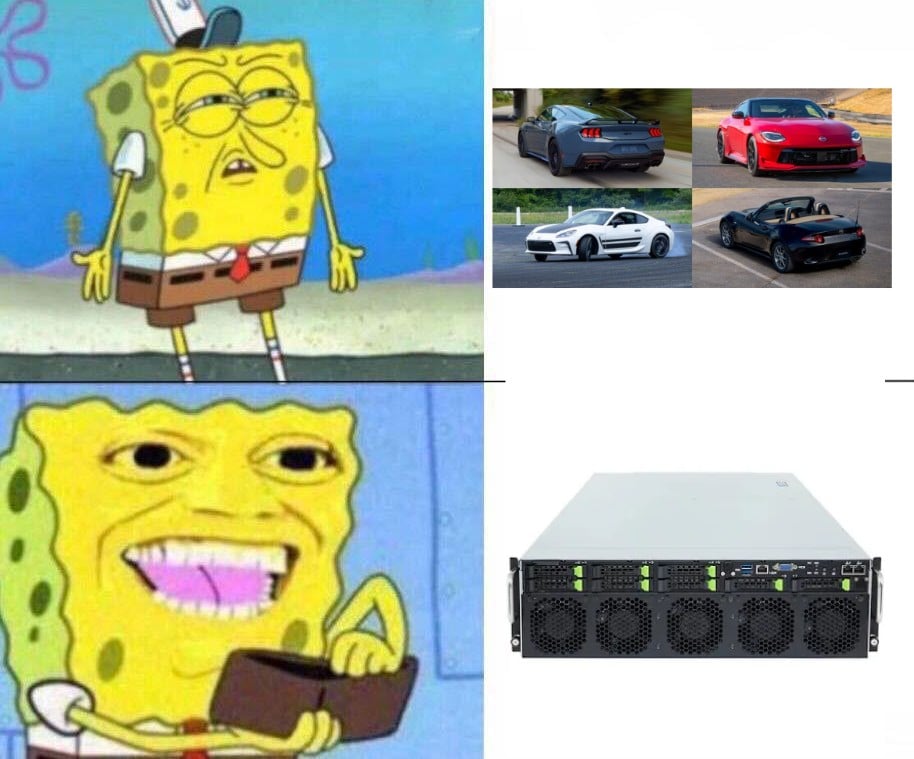this post was submitted on 14 Nov 2024
518 points (99.2% liked)
memes
10301 readers
2284 users here now
Community rules
1. Be civil
No trolling, bigotry or other insulting / annoying behaviour
2. No politics
This is non-politics community. For political memes please go to [email protected]
3. No recent reposts
Check for reposts when posting a meme, you can only repost after 1 month
4. No bots
No bots without the express approval of the mods or the admins
5. No Spam/Ads
No advertisements or spam. This is an instance rule and the only way to live.
Sister communities
- [email protected] : Star Trek memes, chat and shitposts
- [email protected] : Lemmy Shitposts, anything and everything goes.
- [email protected] : Linux themed memes
- [email protected] : for those who love comic stories.
founded 1 year ago
MODERATORS
you are viewing a single comment's thread
view the rest of the comments
view the rest of the comments

I always recommend buying enterprise grade hardware for this type of thing, for two reasons:
Consumer-grade hardware is just that - it's not built for long-term, constant workloads (that is, server workloads). It's not built for redundancy. The Dell PowerEdge has hotswappable drive bays, a hardware RAID controller, dual CPU sockets, 8 RAM slots, dual built-in NICs, the iDrac interface, and redundant hot-swappable PSUs. It's designed to be on all the time, reliably, and can be remotely managed.
For a lot of people who are interested in this, a homelab is a path into a technology career. Working with enterprise hardware is better experience.
Consumer CPUs won't perform server tasks like server CPUs. If you want to run a server, you want hardware that's built for server workloads - stability, reliability, redundancy.
So I guess yes, it is like buying an old truck? Because you want to do work, not go fast.
Is this mythology? :P
Server stuff is unusual and mysterious, rare, and expensive - I get the allure.
I like your second point (tho wouldn't say a lot, most of us just want services at home + ProxMox or even Linux in general isn't the most common hypervisor to learn for getting a job in like mid-sized companies), but for the rest - PC can take loads just as well as enterprise/server, this isn't the 90s or early 2000s when you eg got shitty capacitors on even the best consumer mobos. Your average second gen Core PC could run non-stop since it's birth to today.
The exception are hard drives, which homelabbers buy enterprise anyways.
BTW - who has their home lab on full load all the time (not sarcasm, actually asking for usecases)?
The rest is just additional equipment one might need or might not. A second CPU slot is irrelevant when buying old servers, ram slots need to be filled to even take advantage of the extra lanes of server CPUs and even then older tech might still be slower than dual channel ddr5, drive bays are cheap to buy ... but if you want nicely looking hot-swappable PSU then you need a server/workstation case.
Server vs consumer CPUs mostly differ in how well they can parallelize tasks, mostly by having more cores and more lanes. But if a modern CPU core outclases older server CPU cores like 10:1 that logic just doesn't add up anytime. Both do the same work.
Imho old servers aren't super cheap but are priced accordingly.
I think this whole debate consumer vs enterprise hardware (except hard drives ofc) can be summed in a proxy question of - do homelabbers need registered ECC RAM?